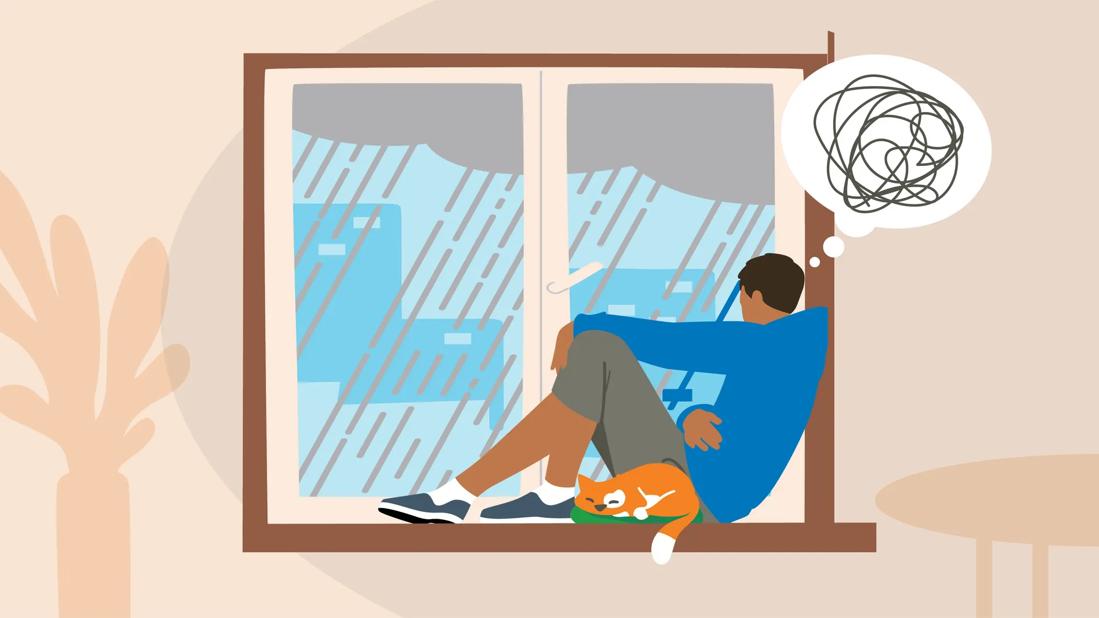Changes in your child’s emotions, behavior, sleep and appetite can all point to depression

Depression often goes undiagnosed in teenagers — in part because it can be hard for parents to tell the difference between run-of-the-mill moodiness and more serious mental health concerns.
Advertisement
Cleveland Clinic is a non-profit academic medical center. Advertising on our site helps support our mission. We do not endorse non-Cleveland Clinic products or services. Policy
But you don’t have to figure it out alone.
Psychologist Susan Albers, PsyD, and pediatrician Veronica Issac, MD, share 10 signs your kid may be depressed and how to get them the help they need.
If your kid’s going through a standard-issue bout of teenage moodiness (not depression), it will likely be mild, short-lived and triggered by specific stressors.
It’s normal for teens to struggle with their emotions. While they may look and act like adults sometimes, their prefrontal cortexes (the part of the brain that regulates emotions) won’t be done growing until they’re well into their 20s. They’re also dealing with hormone changes and other side effects of puberty.
But if you’re noticing the following signs of depression, it’s worth following up with their doctor.
To assess whether your teen’s mood swings are a symptom of depression, think about how intense they are, how long they last and whether they’re tied to a specific situation.
When teens have depression, their behavior often changes right along with their moods. Dr. Albers says they may experience:
Advertisement
If your teen’s behavior becomes aggressive, call their provider immediately. They will connect you with the resources you need to ensure your (and your kid’s) safety.
Dr. Issac recommends having your child seen if the amount they eat or sleep (or how much they weigh) changes significantly.
“It’s important to make sure there isn’t an underlying health issue fueling those changes,” she says.
Depression can cause physical symptoms. So, take notice if your kid is having problems like:
If your teen’s having problems in several aspects of their life — like their schoolwork, extracurriculars and friendships — it could suggest an underlying issue like depression.
Dr. Albers recommends chatting with your kid about everything from their extracurriculars to their favorite music. And remember: You’re there to listen, not judge.
“I encourage parents to ask,” Dr. Albers clarifies. “Have an ongoing conversation with your child and be open for them when they are ready to talk.”
Depression can cause confidence and self-esteem issues. Just as confidence and self-esteem issues can cause depression. Feeling worthless can also lead your teen to avoid people and activities they used to enjoy.
If you catch your teen criticizing, blaming or demeaning themself regularly, it might be time to get them assessed for depression.
“It’s normal to get down on yourself sometimes,” Dr. Issac recognizes, “but if it’s happening too often, those self-defeating thought patterns can become ingrained, making depression and anxiety worse.”
Dr. Issac also underscores the importance of monitoring teen social media use.
“While social media can be a positive tool for being creative and connecting with friends or family, we also know it can contribute to negative behaviors such as bullying, body shaming and negative self-talk,” she explains.
Here’s the thing about depression and substance use: If you’ve got one, your risk of developing the other goes up.
If your child is grappling with addiction, talk to their provider. They’ll connect you with the resources you need to support them.
When you hear “self-harm,” you probably worry about your teen hitting, cutting or burning themselves. But some forms of self-injury, like hair pulling or skin picking, are less obvious.
If you think your kid is self-harming, Dr. Issac urges you to call their pediatrician.
If your teen expresses thoughts of suicide, contact their pediatrician immediately. They’ll help you create a safety plan and share resources to call in an emergency. You can always access free, confidential help in the U.S. by:
Advertisement
If you’re not sure whether your teen is depressed, and there’s no immediate threat to their health or safety, turn first to a source you already know well: your child’s pediatrician.
You may feel inclined to find a therapist ASAP, but Dr. Albers advises it’s best to start with your pediatrician or family doctor.
“They’ve had a longer-term relationship with you, so they understand you and your child and how they’re developing,” she says.
Your pediatrician is qualified, too: The American Academy of Pediatrics (AAP) guidelines encourage providers to conduct depression screening for children ages 12 and up as part of their routine exams. That means they have a lot of experience assessing kids like yours for mental health concerns.
And don’t be alarmed or upset if their provider asks to speak privately with your teen without you in the room.
“Sometimes, teens have trouble telling their parents they’re depressed because they’re not sure what kind of response they’re going to get,” Dr. Issac says. The doctor will fill you in about any serious concerns.
Mental health is key to your teen’s well-being. Being involved in their life — and having their pediatrician do routine screenings for depression during their appointments — can keep the lines of communication open and ensure your child is safe and supported.
Advertisement
“Depression is treatable, and no parent has to face it alone,” Dr. Albers reassures. “With support, care, and open conversations, teens can recover and thrive. The most important step is simply reaching out. Starting that first conversation can change everything.”
To learn more on this topic, listen to the Health Essentials Podcast episode, “The Teen Mental Health Crisis.” New episodes of the Health Essentials Podcast publish every Wednesday.
Advertisement
Learn more about our editorial process.
Advertisement

Look for signs like withdrawing from social eating and not gaining weight — and get treatment early if possible

The need for sleep often takes a back seat for teens, but they need eight to 10 hours of sleep to stay mentally healthy, strengthen their brains and prevent injury

Integrating coping skills into your teen’s daily routine helps turn self-care into a lifelong healthy habit

Talking in the car, resisting the urge to judge and asking specific questions can help rebuild rapport

The vagina is full of healthy and unhealthy bacteria, so discharge can be normal or problematic

Eat the right foods, and get plenty of sleep and exercise

Parents must intervene, in a productive way

A pediatric neurologist explains the troubling rise in teens with tics

Wearing a scarf, adjusting your outdoor activities and following your asthma treatment plan can help limit breathing problems

Your diet in the weeks, days and hours ahead of your race can power you to the finish line

When someone guilt trips you, they’re using emotionally manipulative behavior to try to get you to act a certain way